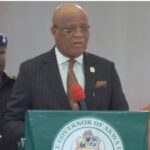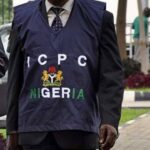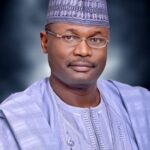The Chairman of the Independent National Electoral Commission, Prof. Mahmood Yakubu, has renewed calls for the establishment of an Electoral Offences Tribunal, emphasising the need for a dedicated judicial body to handle cases of electoral malpractice.
Speaking at the first regular quarterly consultative meeting with the media in Abuja on Friday, Yakubu highlighted the challenges facing the prosecution of electoral offenders, noting that delays in the judicial system often result in cases lingering for years.
He cited the recent conviction of a Returning Officer in Akwa Ibom State, which took nearly six years to conclude, as an example of the slow pace of justice.

Yakubu explained, “One of these areas of reform is the prosecution of electoral offenders. Judicial and legislative action in the last few days underscores our effort to deal with offences involving officials of the Commission assigned to carry out designated responsibilities.
“However, it also highlights the challenges we face in dealing with electoral offences. The recent successful prosecution of a Returning Officer in Akwa Ibom State is a case in point.
“The Commission has been diligently pursuing the case which arose from the 2019 General Election. In this particular case, it took nearly six years to achieve the successful prosecution at the trial court.”
The INEC Chairman explained that under the current system, electoral offences are prosecuted in Magistrate and State High Courts alongside other criminal cases, leading to significant delays.
Unlike post-election petitions, which have strict timelines, electoral offences can take years to resolve, often extending into subsequent election cycles.
The INEC Chairman argued that this undermines efforts to deter electoral fraud and ensure accountability.
“A major obstacle to the speedy dispensation of justice in this regard is that electoral offences are not time-bound as is the case with post-election offences through the tribunals.
“Furthermore, they are solely prosecuted by the Magistrate and State High Courts in the jurisdiction where the alleged offences are committed.
“No priority attention is given to such cases as the courts deal with a variety of other cases.
Consequently, electoral offences are carried over from one General Election to another which may sometimes affect the diligent prosecution of the cases,” he noted.
To address this challenge, he urged lawmakers and stakeholders to support the creation of an Electoral Offences Tribunal with exclusive jurisdiction and a fixed timeframe for resolving cases.
Yakubu also called on the media to advocate for the reform, stressing that a more efficient prosecution process would strengthen Nigeria’s democracy.
Despite these challenges, Yakubu noted some progress in prosecuting electoral offenders. He revealed that through INEC’s collaboration with the Nigerian Bar Association and the Economic and Financial Crimes Commission, cases involving 774 alleged offenders from the 2023 General Election are being prosecuted.
So far, convictions have been secured in Kebbi, Kogi, Lagos, Kwara, and Gombe States, particularly in cases of vote-buying.
The INEC Chairman added, “Through our collaboration with the Nigerian Bar Association cases involving 774 alleged offenders from the 2023 General Election are being prosecuted. So far, successful prosecutions have been recorded in Kebbi and Kogi States while our collaboration with the Economic and Financial Crimes Commission on vote-buying has yielded similar results in Lagos, Kwara and Gombe States. Yet, many cases are still pending.
“It is therefore imperative to renew our call for the creation of the Electoral Offences Tribunal that has a specific jurisdiction and limited timeframe for the speedy dispensation of cases. I urge the media to join in this patriotic advocacy for the good of our electoral democracy.”
Yakubu also highlighted the increasing number of bye-elections due to vacancies in legislative seats, citing recent cases caused by the deaths of serving members and absenteeism.
The Commission, he said, remains committed to ensuring smooth electoral processes despite these challenges.
Yakubu noted, “In addition to the end-of-tenure elections, there is an increasing number of bye-elections to be conducted. In the last three weeks alone, vacancies have occurred in one Federal Constituency and two State Constituencies caused by the death of serving members.
“In another State Constituency, the State Assembly declared the seat vacant as a result of absenteeism, following the prolonged absence of the member from sittings of the House in violation of Section 109(1)[f] of the Constitution of the Federal Republic of Nigeria 1999 (as amended). The matter of pending bye-elections is also on the agenda for this meeting.”
The NUJ National Secretary, Achike Chidi, observed that INEC has often been reluctant to prosecute offenders, not due to a lack of willingness but because of legal and structural constraints.
He emphasised that this was a major reason why stakeholders have been pushing for an Electoral Offences Tribunal, which would allow INEC to focus on its core responsibilities while ensuring electoral offenders face justice.
He called on the National Assembly to expedite action on establishing the tribunal, arguing that INEC is burdened with responsibilities that could be better handled by a specialized judicial body.
Regarding electoral reforms, he urged INEC to consider alternative voter identification methods, such as using national identity cards, international passports, or driver’s licenses, to expand voter access and participation.
Chidi concluded by reaffirming the NUJ’s commitment to working with INEC to promote democracy and electoral integrity in Nigeria.
“The INEC Chairman also talked about the fact that every electoral process presents with new opportunities. And as these new opportunities arise, they have to be confronted with new responses. And so perhaps we will also look at the issue of using other processes for the purpose of even voting.
“Recognise processes such as the people who possess national identity cards, international passports, and driving licenses. Perhaps these are also things that they can also look at, as they look at other processes.
“If there is one thing I think some of us have noticed, it is the fact that INEC has always been very reluctant when it comes to this pressure on them to prosecute offenders. It is not that they do not want to prosecute offenders.
“I think it’s part of the reasons why people have been making a case for this electoral tribunal to be put in place. We should also encourage the National Assembly to set these things in motion.”








